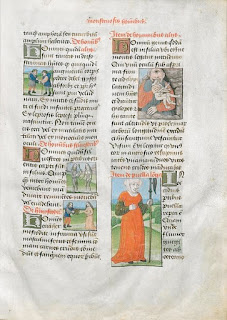Born in a small town in Brussels in 1201, he was sent at the age of five to school in Liège to study the trivium and quadrivium. When he was 16, he was ordained a priest, but after 15 years at Cantimpré he entered the Dominican order and was sent to Cologne for more advanced studies in theology, which he did under Albertus Magnus. He moved a few more times, but near the end of his life traveled throughout Germany, France, and Belgium with the title "Preacher General."
Thomas wrote many works, some of which were copied again and again, and even published in later centuries. One of them, De natura rerum (On the nature of things), had 22 chapters ranging from human anatomy, sea monsters, "Monstrous men" of the East (including cynocephali), astrology, trees, animals, eclipses and planets, etc. He included in this encyclopedia information from Aristotle, Pliny the Elder, St. Ambrose, William of Conches, and Jacques de Vitry.
His other major work used a metaphor of bees in a hive to discuss moral and spiritual edification. Bonum universale de apibus ("Universal good for the bees") has one item I want to mention. Back here, we saw the Statute of Kalisz established that Jews could not be accused of blood libel, the kidnapping of children to use their blood for rituals. This was common for centuries. Thomas came up with a "logical" explanation of blood libel, or blood accusation. Thomas refers to the New Testament passage in Matthew 27:25, when the Jews tell Pilate "May his blood be on us and on our children." Jews killed Christians and used their blood, so the theory went, in order to release themselves from their ancestors' self-imposed curse.
He also wrote several biographies of saints, one of whom was born in Belgium like him. Let's talk about Christina the astonishing next time.

No comments:
Post a Comment
Note: Only a member of this blog may post a comment.